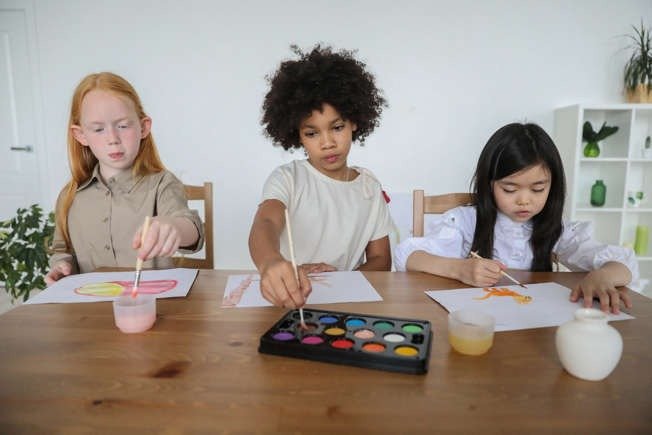Montessori Parenting: A Gentle Parent’s Guide

Source: https://www.msn.com/
Dr. Maria Montessori, an Italian physician and educator, transformed child development and education with the Montessori parenting method. This approach is a teaching philosophy that enhances parenting skills, though it is not a strict guide for raising children. The Montessori method emphasizes key principles like gentle parenting, fostering resilience, and promoting children’s freedom and independence.
The Principles of the Montessori Method
The Montessori parenting style is based on principles that promote more effective and nurturing parenting. These principles focus on gentle parenting, fostering a healthy, empathetic relationship between parents and children. The method encourages applying these principles at home to support continuous growth and learning. Key to this approach is the foundation of respect, which helps create a strong, supportive environment for children. Understanding these principles allows parents to better implement the Montessori method in their daily lives.
1. What It Means to Respect Your Child: The Montessori method emphasizes the importance of respect in parenting, which involves seeing the world through your child’s eyes, understanding them, and trusting them. Respect is a subtle art that requires careful observation of your child’s behavior to identify their strengths and weaknesses. Children need to feel valued, and their sense of self-worth grows through mutual respect. The approach encourages parents to acknowledge their child’s independence and individuality, allowing them to learn from their mistakes in a safe environment. Treating children with respect helps foster trust and promotes their growth and development.
2. Acknowledge Your Child’s Independence: The Montessori parenting style focuses on creating a safe and healthy learning environment where children interact with the world and grow through experience, fostering their independence. Parents are responsible for providing necessary tools and observing their child’s progress to adjust their approach as needed, focusing on the child’s individual needs and uniqueness. The method values the learning process over rewarding talents, encouraging children to think independently. Mistakes are part of the learning journey, and parents are encouraged to trust their child with challenges, supporting their growth and curiosity with continuous learning opportunities.
3. Giving Your Child Freedom, Safely: The Montessori parenting style emphasizes giving children the freedom to explore, while ensuring their safety through carefully created opportunities for growth. This freedom fosters confidence in children. Unlike traditional parenting methods, the Montessori approach does not use punishment, but instead focuses on teaching responsibility and natural consequences. Parents are encouraged to set a positive example, as children learn by observing their behavior. While mistakes are inevitable, the key is to approach discipline with calm communication and patience, prioritizing guidance over punishment.
4. How to Prepare a Healthy Learning Space: The Montessori method encourages parents to create a safe, organized, and meaningful learning environment at home, which doesn’t disrupt daily life. Start by childproofing the space and ensuring children have easy access to purposeful tools and materials that expand their knowledge. While books are valuable, moderation is key too much of one activity can hinder growth. Patience is essential, as children progress at their own pace. The learning space should be balanced, child-sized, and well-organized to inspire independence, boost confidence, and foster a clear sense of individuality.
5. Why Play Equals Work: The Montessori method emphasizes that children learn through play, which is seen as a form of work. Play allows children to explore, touch, and experience the world, fostering their growth and development. Parents are encouraged to create a safe, engaging environment where hands-on activities help children expand their knowledge. While play can get messy, it’s important to let children explore freely, intervening only if they’re in danger. This approach supports creativity, imagination, and joy, while helping children rewire their brains and develop important skills.
6. How Hands-On Learning Helps Children: The Montessori method emphasizes a hands-on approach to learning, stimulating a child’s sense of wonder and encouraging growth through creative, interactive tools and materials. Parents are encouraged to apply this method at home, as education extends beyond school. Children learn best through trial and error, and sometimes the best support is to give them space to solve challenges and reflect on their mistakes. This approach fosters exploration, independence, creativity, and an understanding of consequences, whether at home or in the classroom.
7. The Importance of Observation: Montessori parenting centers on the ability to observe your child’s growth and adjust their learning environment accordingly. Parents are responsible for monitoring their child’s development, listening, and adapting the materials and education they provide to meet their needs. The home should evolve to provide a continuous flow of knowledge, offering variety and balance in experiences. For example, while a child may show interest in music, it’s important to expose them to a range of activities. Observing your child closely helps you refine their learning process, similar to how Montessori teachers use observation to understand their students’ perspectives.
Practicing the Montessori Method at Home
The Montessori method is most effective when parenting and teaching align. Parents should create an organized, purposeful space at home to support their child’s learning. The method also teaches parents valuable lessons, particularly in patience, as they learn alongside their children. Ultimately, a Montessori-inspired home focuses on meeting the child’s needs and making parenting enjoyable by incorporating these principles into daily life.
Conclusion
The Montessori method encourages parents to create a hands-on learning environment that fosters freedom and independence, allowing children to explore at their own pace within a safe and structured space. Unlike traditional education with grades, tests, and punishment, Montessori focuses on letting children choose how they play and work, with parents providing the necessary educational tools. While the method has transformed education and parenting, it is just one of many valuable approaches. Parents are encouraged to explore various parenting methods to enhance their child’s life and education.
Read More: https://childreninfobank.com/safebank/montessori-parenting-a-gentle-parents-guide/
Image Source: https://www.msn.com/





